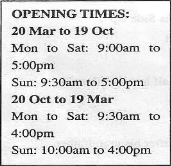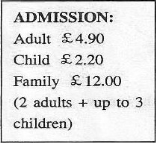题目内容
阅读下面的短文,从短文后各题所给的四个选项(A、B、C和D)中,选出可以填入空白处的最佳选项,并在答题卡上将该项涂黑。
One afternoon I toured an art museum and I was looking forward to a quiet view of the masterpieces(名作) A young couple viewing the paintings ahead of me talked between themselves. I watched them a moment and she was doing all the talking.
I admired his patience for up with her talkativeness. Annoyed by their noise, I moved on.
I with them several times as I moved through the various rooms of art. I heard her constant flood of words, I moved quickly. I was making a purchase(购买) at the counter of the gift shop when I the couple approaching(靠近) the exit. Before they left, the man took out a and then tapped his way into the coatroom to get his wife’s jacket.
“He’s a man,” the clerk at the counter said. “Most of us would if we were blinded at such a young age. During his recovery, he made a vow(发誓) that his life wouldn’t . So, as before he and his wife come in there’s a new art show.”
“But does he get out of the art?” I asked. “He can’t see.”
“Can’t see! You’re . He sees a lot. More than you or I do,” the clerk said.. “His wife each painting so he can see it in his .”
I something about patience, courage and love that day. I saw the of a young wife describing paintings to a person without and the courage of a husband who would not allow blindness to change his life. And I saw the love by two people as I watched this couple walk away hand in hand.
1.A. continuously B. carefully C. hardly D. lively
2.A. commanded B. suggested C. decided D.insisted
3.A. keeping B. staying C. coming D.putting
4.A. met B.quarreled C. viewed D.compared
5.A.As though B. Now that C.Each time D. Ever since
6.A. up B. away C. in D. out
7.A. watched B. considered C. realized D. noticed
8.A. walking stick B. walking dog C. cell phone D. wallet
9.A. patient B. unlucky C. brave D. clever
10.A. give in B. give up C. give away D. give back
11.A. worsen B. change C. end D. darken
12.A. whenever B.wherever C. however D. whoever
13.A. how B. if C. whether D. what
14.A. right B. wrong C. foolish D. careless
15.A. paints B. buys C. admires D.describes
16.A. spirits B.ears C. head D. soul
17.A. learned B. found C. judged D.considered
18.A. kindness B. words C. courage D. patience
19.A. stop B. sight C. complaint D. delay
20.A. shown B. valued C. shared D. received
1.A
2.C
3.D
4.A
5.C
6.B
7.D
8.A
9.C
10.B
11.B
12.A
13.D
14.B
15.D
16.C
17.A
18.D
19.B
20.C
【解析】本文是一篇记叙文,讲述了我在博物馆偶遇的一对看似烦人的夫妇,实际上却是丈夫瞎了,妻子为了给他希望,带他去画展,一幅画一幅画不厌其烦地给他描述。
1.考查副词辨析A continuously持续地;B.carefully仔细地;C.hardly 几乎不;D.lively有生机的。根据后文中我看了他们一会儿,并且发现那对夫妇中的女人在一直在说,所以这里应该是指他们持续的聊天。故选A
2.考查动词辨析A.commanded命令;B.suggested建议;C.decided裁决、判断;D.insisted坚持。我看了他们一会儿,发现这对夫妇中的女人一直在说。Decide有裁决、判断的意思,这里是指我通过观察知道是那个女人在说话,故选C
3.考查短语辨析,结合后面的up( with),A.keeping跟上;B.staying熬夜;C.coming发生;D.putting忍受。根据语境可以知道我是很佩服夫妇中的男士能够有耐心忍受住女士不停地说,故选D
4.考查动词辨析A.met见面;B.quarreled吵架;C.viewed观察、浏览;D.compared比较。结合文章来看,这里指的是我和这对夫妻在博物馆的游览中又遇见了好几次。故选A
5.考查词语辨析A.As though尽管;B.Now that既然;C.Each time每次;D.Ever since自从。这里是一个each time引导时间状语从句,意思是:每一次我听见她那频繁的仿佛滔滔洪水一般的话语的时候,我快速的走过了。
6.考查短语辨析,结合前面的move来看,A.up升级;B.away离开、搬到别处;C.in搬进去;D.out搬走。结合前文来看,我很讨厌那个女士,所以一旦碰见她了之后,我会很快的离开。故选B
7.考查动词辨析A.watched观察;B.considered认为;C.realized意识到;D.noticed注意到。结合上下文来看,这里是指我在礼品店的柜台买礼物的时候注意到了那对夫妇靠近出口。故选D
8.考查联系上下文A.walking stick拐杖;B.walking dog遛狗;C.cell phone手机;D.wallet钱包。由后文所知,这个男人是一个盲人,所以这里应该是他用拐杖走路,故选A
9.考查形容词辨析A.patient有耐心的;B.unlucky不幸运的;C.brave勇敢的;D.clever聪明的。由后文可知,这个男士很年轻的时候就成为了盲人,妻子起誓不会变心离开他,他和他的妻子在每次有了新的艺术展览的时候都会前来观看。由此可以推断出这是一个勇敢面对人生的人,故选C
10.考查动词辨析A.give in屈服;B.give up放弃;C.give away泄露、失去;D.give back归还、恢复。大多数人在失明了的时候会很难过从而放弃治疗。故选B
11.考查动词辨析A.worsen更坏;B.change变化;C.end结束;D.darken变暗。因为男人成为了盲人,所以他得到了妻子不会变心的誓言。
12.考查让步状语从句引导词A.whenever无论何时;B.wherever无论在哪儿;C.however无论如何;D.whoever无论是谁。该句中各个成分完整,唯独缺时间状语,故选whenever。
13.考查联系上下文A.how如何;B.if如果;C.whether是否;D.what什么。根据后文:那个男人可以看见很多东西,比你和我看到的都多。可以知道这里是针对看到的内容提问的。故选D
14.考查形容词辨析A.right正确的;B.wrong错误的;C.foolish愚蠢的;D.careless粗心的。根据该空前的句子我们可以知道作者认为男人看不见东西,可是后文中员工回答说他看到了很多东西。故选B
15.考查动词辨析A.paints绘画;B.buys购买;C.admires佩服;D.Describes描述。这里是指男子看不见,但是有妻子描述每一幅画,所以他能“看”到故选A。
16.考查名词辨析A.spirits精神;B.ears耳朵;C.head头;D.soul灵魂。因为男人看不见画,是妻子给他描述之后男人想象的,所以是在男人的脑海里。故选C
17.考查动词辨析A.learned学习;B.found发现;C.judged评价;D.considered认为。该句意思为:我那天学到了一些关于耐心、勇气和爱的事情。
18.考查名词辨析A.kindness和蔼;B.words话;C.courage勇气;D.patience耐心。结合上下文,因为丈夫看不见了,妻子不厌其烦的跟丈夫描述油画的内容,所以这里是指年轻妻子的耐心。故选D
19.考查名词辨析A.stop停止;B.sight视力;C.complaint抱怨;D.delay延迟。这里是指看不见了的丈夫。Without sight就是看不见了的意思。故选B
20.考查动词辨析A.shown展示;B.valued珍视;C.shared分享、共有;D.Received接收。作者被俩夫妇之间互助的爱感动了,所以这里是夫妇之间共有的爱,故选C
考点:考查记叙文阅读

后出生的学生,思想特殊、行为方式和价值观令人担忧。假如你是一名90后出生的学生李华,请根据下表中所提供信息以“Do trust us—a generation born in the 90s”为题写一篇英语演讲稿,以消除人们的忧虑。
90后的境遇 | 面临更多的升学和就业烦恼,所处环境竞争更加激烈。 | |
人们的忧虑 | 1.注重自我,轻视合作,…… 2.缺乏毅力,容易气馁,…… 3.盲目追求,渴望成名,…… | |
我们的长处 | 有勇气来面对挑战,…… (请考生联系自己拟定内容,再列举两至三点。) | |
注意:
1.对所给要点,逐一陈述,适当发挥,不要简单翻译。
2.词数120左右。开头和结尾已经写好,不计入总词数。
3.演讲稿中不得提及考生所在班级及本人姓名。
4.参考词汇:盲目:blindly 毅力:perseverance
Good afternoon, everyone!
The topic of my speech today is “Do trust us—a generation born in the 90s”.
Living in an environment full of fiercer competition, we are faced with more problems in entering higher schools and getting employed.
_____________________________________________________________________
_____________________________________________________________________
_____________________________________________________________________
Thank you for your listening.


 .rather than B. according to
.rather than B. according to